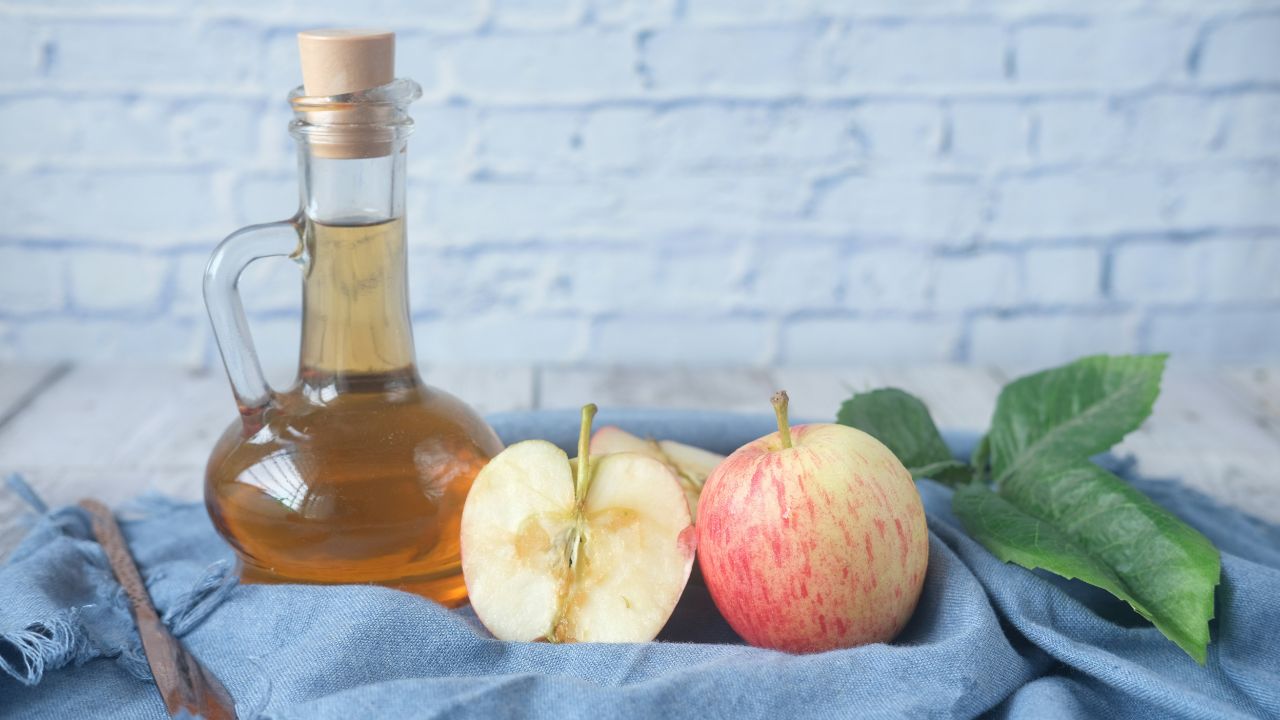
Apple cider vinegar as a sustainable household remedy for home and travel?
Why apple cider vinegar should always be in your luggage
What are home remedies?
A home remedy is a simple, traditional remedy that is usually made from natural or everyday ingredients and is used at home to alleviate health complaints or solve minor everyday problems. These remedies are often used without a doctor’s prescription or professional treatment and are based on folk medicine knowledge that is passed down from generation to generation.
Please note: The effect of many home remedies has often not been scientifically proven. In addition, everyone reacts differently to the use of home remedies. If you feel unusual after using home remedies, or if you even experience skin irritation, please consult a doctor.
What is apple cider vinegar and how is it made?
Apple cider vinegar is produced through the fermentation of apples, which takes place in two main steps. First, the apples are crushed and the juice extracted, whereby natural yeasts and bacteria convert the sugar in the apple juice into alcohol, which is known as alcoholic fermentation. In the second step, acetic acid fermentation, acetic acid bacteria (Acetobacter) convert the alcohol into acetic acid, which gives apple cider vinegar its characteristic sour taste and preservative properties.

Which apple cider vinegar can I use?
It is best to use naturally cloudy organic apple cider vinegar for these applications. Organic apples reduce the risk of harmful substances, and unfiltered apple cider vinegar contains important nutrients and enzymes as it is not pasteurized.
Possible uses of apple cider vinegar as a sustainable household remedy:
Apple cider vinegar is one of my favorite home remedies and I always have it on hand at home. Why? Apple cider vinegar can be used in an incredible number of ways and has already helped me a number of times:
1. use for digestive complaints:
Our first application option: By taking a teaspoon of apple cider vinegar in a glass of lukewarm water before meals, you can stimulate the production of stomach acid. This promotes more efficient digestion, as food is broken down better and nutrients are absorbed more effectively. It also helps to reduce flatulence and unpleasant feelings of fullness after eating. Apple cider vinegar can also boost the metabolism and curb the appetite. Its active ingredients support fat burning and stabilize insulin levels, which can reduce food cravings. Consuming apple cider vinegar can help to promote a feeling of satiety, which prevents overeating.
2. apple cider vinegar to alleviate skin problems:
Diluted apple cider vinegar can help with skin problems such as acne, eczema and sunburn. It is often used as a toner to balance the pH of the skin. This seems almost too good to be true, but it is definitely worth a try. I myself have long suffered from skin problems, including acne and sun allergies, and was finally able to find relief.
A personal tip: It is best to apply the diluted apple cider vinegar to the affected areas of the body with a cotton pad before going to bed instead of washing it off again straight away. Admittedly: The smell may not be very pleasant and those around you might curse you a little, but for me at least, it was extremely worth it.
3. apple cider vinegar for hair care:
Apple cider vinegar can also be used as a hair conditioner to make the hair shiny and cleanse the scalp. It can also help to reduce dandruff and promote hair growth. Conventional shampoos often damage the hair’s protective acid mantle, which leads to brittle and split hair. In addition, many shampoos over-acidify the scalp, whose natural pH value is between 4 and 5, causing problems. Apple cider vinegar can help to balance this pH value. The antibacterial effect of apple cider vinegar fights bacteria and fungi on the scalp, which often cause hair loss and dandruff.
To do this, simply wash your hair two to three times a week with an apple cider vinegar rinse.
Anleitung:
- mix 2 tablespoons of apple cider vinegar with about 250 ml of lukewarm water.
- wash your hair as usual with a mild shampoo.
- then pour the apple cider vinegar mixture over your wet hair and massage it into the scalp.
- leave the conditioner on for 3 to 10 minutes, depending on your hair type. You can then wrap your hair in a cotton towel.
- the mixture should then be rinsed out thoroughly with lukewarm water. Don’t worry about the smell: the vinegar smell disappears when the hair is dry.
- apple cider vinegar to soothe a sore throat:
Apple cider vinegar has powerful antibacterial and antiviral properties that can help kill pathogens in the throat.
The anti-inflammatory properties of apple cider vinegar can also help to reduce swelling and irritation in the throat. Gargling with an apple cider vinegar solution soothes the inflamed areas in the throat, which can quickly relieve pain and loosen or thin stuck mucus. This makes it easier to cough up and ensures freer breathing, which is particularly beneficial for colds and flu.
Instructions for use:
Mix one to two tablespoons of apple cider vinegar into a glass of warm water. This mixture should be stirred well to distribute the apple cider vinegar evenly, then gargle with the solution for about 30 seconds before spitting it out again. It is best to repeat the whole process several times a day so that the apple cider vinegar can take effect as quickly as possible.
Apple cider vinegar to soothe insect bites and stings:
Apple cider vinegar can help to relieve the itching and swelling of insect bites and stings. Area. The cool thing about apple cider vinegar: It has strong antibacterial properties that can prevent the wound from becoming infected. This is particularly important as scratching insect bites and stings increases the risk of infection. The anti-inflammatory properties of apple cider vinegar also help to reduce swelling and redness, leading to faster relief of symptoms. In addition, applying apple cider vinegar to an insect bite or sting can have a cooling and soothing effect and sometimes even provide immediate relief from severe itching.
Application
There are various methods of using apple cider vinegar to treat insect bites and stings:
Direct application: Simply dip a cotton ball or clean cloth in undiluted apple cider vinegar and place directly on the sting or bite. Leave it on for a few minutes and then rinse it off if you like.
Diluted solution: Mix equal parts apple cider vinegar and water. Soak a cloth or cotton ball in the mixture and place it on the affected area. This is particularly good for sensitive skin.
Apple cider vinegar bath: Add a cup of apple cider vinegar to a lukewarm bath and soak for 15-20 minutes. This helps to relieve itching and swelling over a larger area, especially if you have multiple stings or bites.
Especially after a hike in the rainforest, this is guaranteed to save your nights!…trust me on this one 😀
But please take note of all these cool tips:
Apple cider vinegar is highly acidic and should therefore always be used diluted to avoid skin and tissue irritation. You should also consult a doctor before using apple cider vinegar regularly as a home remedy, especially if you have health problems or are taking medication.
Summary
Apple cider vinegar is an incredible home remedy that has often helped me too. For some it works and for some it doesn’t. Nevertheless, every step away from additional plastic and artificially produced care products (you can’t believe how many acne products I had in my bathroom for a while) is worth a try.
However, if you have any intolerances and/or allergies, always be careful and consult a doctor before use to clarify whether apple cider vinegar is suitable for you.
This article may contain affiliate links. I receive a small commission when you purchase products or services through these links at absolutely no extra cost to you. This is a free way to support me and allow me to continue to create inspiring adventure travel guides. See my disclosure notice for more information.

